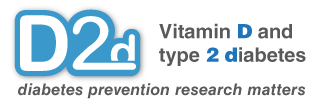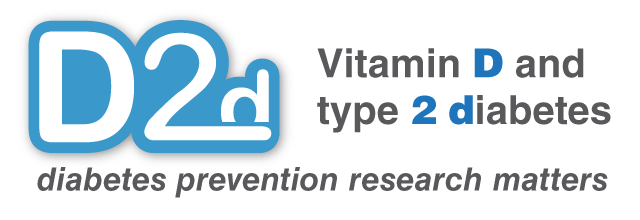Data Sharing Policy
Data Sharing Policy
Ancillary studies that utilize resources and data of the D2d study will be encouraged to harness the considerable potential of the parent study to obtain new knowledge beyond its primary goals and objectives. This knowledge may include identification of additional risk factors for diabetes or genetic factors related to the diagnosis or progression of diabetes or to the response to therapy, as well as extension of the scope of participant data collection and assessment to identify co-morbidities and their impact on diabetes. The D2d Study Group recognizes that ancillary studies augment and promote the continued interest of both participants and D2d investigators; therefore, sharing research data and bio-specimens and inviting ancillary studies that may also include assessment of new outcomes, beyond diabetes, is a priority of the D2d Study Group to maximize the full potential of the parent study.
To protect the integrity of D2d, ancillary study proposals must be reviewed and approved by the D2d Ancillary Studies Evaluation subcommittee, Steering Committee, and Data and Safety Monitoring Board before implementation. In addition to meeting the standard for high scientific merit, the major criterion for approval of an ancillary study is that it does not negatively impact the conduct of the parent D2d study.
To assist in Data Sharing and to maximize the potential impact of the proposed research, a central repository for storage of human tissue samples has been established by the Central Laboratory and a formal Ancillary Studies Policy and Procedures has been posted to encourage ancillary studies and to allow investigators within and outside of the D2d Study Group structured access to D2d data and bio-samples. The Ancillary Studies Policy and Procedures document outlines the policies and procedures that will be followed in respect to the review and evaluation of ancillary study applications and conduct of ancillary studies, including publications of results. To protect the D2d Study Group from a legitimate interest in benefiting from its investment of time and effort, the newly generated data will become available for research no earlier than the acceptance for publication of the main findings from the final data set. This data-sharing plan is in accord with the NIH data sharing policy, which is available at http://grants.nih.gov/grants/guide/notice-files/NOT-OD-03-032.html.
The primary sponsor, NIDDK, has established a Central Repository for the eventual archival and storage of data and bio-samples collected in large, multi-site studies funded by NIDDK. The D2d Coordinating Center will work with the NIDDK Central Repository to coordinate procedures for coding, shipping, processing, receipt, and storage of study samples that are to be maintained in the Repository. All data and samples transferred to the Repository will be under the custodianship of the NIDDK. The D2d Steering Committee will have proprietary control of and exclusive access to the data and samples for set periods of time after the completion of study milestones, consistent with the NIDDK Data Sharing Policy. After that period, data and samples will be shared with the wider scientific community in accordance with the NIDDK Data Sharing Policy. Attachment A describes the different D2d datasets that will be shared with the NIDDK Central Repository and proposed dates for sharing. The range for the dates will be narrowed after the study is ongoing and dates can be approximated better.
The D2d Study Group is committed to communicate important study results not only to the scientific community through published manuscripts and presentations at national meetings but also to participants through direct communication and the lay public through the study’s public website.

